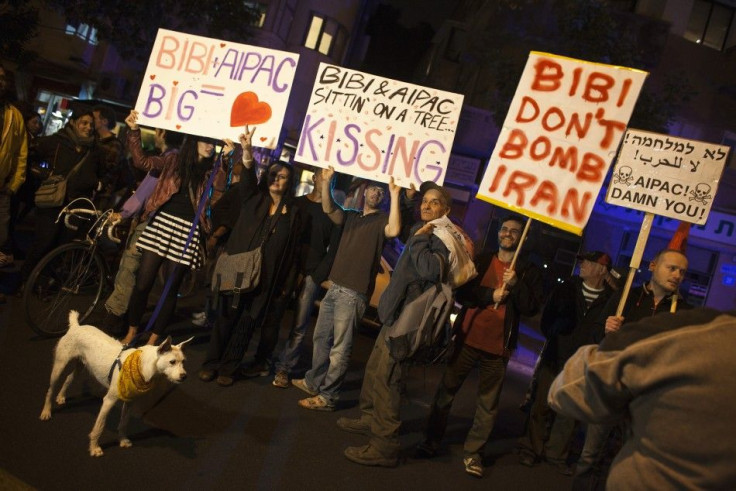Israel’s Dangerous Debate: Opposition Resists Attacking Iran Amid Brinkmanship In Tel Aviv
ANALYSIS

Israel may be closer than ever to launching a unilateral missile attack against Iranian nuclear facilities, and the debate over this explosive issue has reached a fever pitch in Tel Aviv.
The entire country is bristling, in more ways than one. While the more hawkish members of the government step up their rhetoric against Iran, opposition politicians and many ordinary citizens are increasingly alarmed about the potential for deadly conflict.
A poll released on Thursday by the Israel Democracy Institute and Tel Aviv University found that most Jewish Israelis oppose a strike against Iran. The survey of 516 people found only 27 percent in favor of a strike, according to Haaretz. But a full 61 percent were unwilling to engage in military action against Iranian nuclear facilities.
Those sentiments were echoed in a Thursday speech from opposition leader Shaul Mofaz. He heads up Kadima, the party that holds the biggest share of seats in the Knesset*parliament) but has failed to effectively leverage that plurality in its ongoing conflict with Prime Minister Benjamin Netanyahu's right-wing Likud party.
Mofaz's speech was searing.
"Mr. Prime Minister, you're creating panic. You are trying to frighten us and terrify us. And in truth, we are scared: scared by your lack of judgment, scared that you both lead and don't lead, scared that you are executing a dangerous and irresponsible policy," he said, according to the Israeli newspaper Globes.
"The middle class has already gone to the bomb shelters, Mr. Prime Minister, but not because of your incessant prattle about a nuclear Iran. It has gone to the bomb shelters in an attempt to be saved from the senseless and stiff-necked policies that you are waging against it."
The invective was delivered during a Knesset session dedicated to the voting in of Netanyahu's appointee for a new Civil Defense Minister: Avi Dichter. Though Dichter himself has not called explicitly for a strike against Iran, many are interpreting his ascension as a way for Netanyahu to shore up support for his pro-attack agenda.
During the same session, Defense Minister Ehud Barak addressed concerns about Israeli hawkishness.
"In all the wars and peacemaking in Israel's history, there is no issue that has been dealt with in such depth as Iran has," he said.
But he also shrugged off public criticisms, according to the Jerusalem Post.
"The decision to attack Iran, should the time come, will be made by the government and not by groups of citizens nor editorials."
A successful Israeli missile attack against Iranian nuclear facilities would interrupt, at least temporarily, the Islamic Republic's progress in its alleged pursuit of nuclear weapons technology. But it would also be the beginning of a conflict that would likely involve retaliation not only from Iran, but also from militants linked to other anti-Israel groups in the Levant, such as Palestine's Hamas and Lebanon's Hezbollah.
Iran claims that its nuclear program is for peaceful purposes like energy and medicine. Western powers generally agree that Tehran is years away from developing a usable nuclear warhead, but Tehran is notorious for resisting international efforts to inspect its nuclear facilities.
A report released by the International Atomic Energy Agency in March suggested that research conducted in Iran may be on the nuclear weapons track. Suspicions are high, as Iranian President Mahmoud Ahmadinejad and Supreme Leader Ayatollah Ali Khamenei have both called for the destruction of the state of Israel.
This has resulted in a sharp increase in economic sanctions against Tehran over the past year, coupled with diplomatic isolation spearheaded by the United States and its Western allies.
Israel has raised the specter of a potential attack against Iran's nuclear facilities for years. But there are questions as to whether this brinkmanship is genuine -- it could instead be a ploy to push for stronger action from the United States, or to intimidate the Iranian regime.
Speculation about the true intentions of Netanyahu and Barak increased this month as their rhetoric reached bold new levels.
On Aug. 1, Prime Minister Benjamin Netanyahu told reporters that a strike was under consideration.
"Right now the Iranian regime believes that the international community does not have the will to stop its nuclear program," he said.
"This must change and it must change quickly, because time to resolve this issue peacefully is running out."
Last week, Barak also asserted his willingness to take decisive action.
"We are determined to prevent Iran from becoming nuclear [armed], and all the options are on the table," he said, according to Agence France-Presse. "When we say it, we mean it."
On Wednesday, outgoing Civil Defense Minister Matan Vilnai estimated that a conflict spurred by Israeli attacks might last for one month and claim about 500 Israeli lives.
"Israel's home front is prepared as never before," he said, according to Reuters.
In addition, the Israeli government has been handing out gas masks to citizens and commenced testing on an emergency Short Message Service SMS system to keep the country on alert in case of dangerous developments.
These are all serious developments, but there is no indication yet that Israel has made the final decision to pursue a missile strike against Iran's nuclear facilities.
"The issue is complicated, but the issue is being deliberated," said Barak on Thursday.
© Copyright IBTimes 2024. All rights reserved.






















